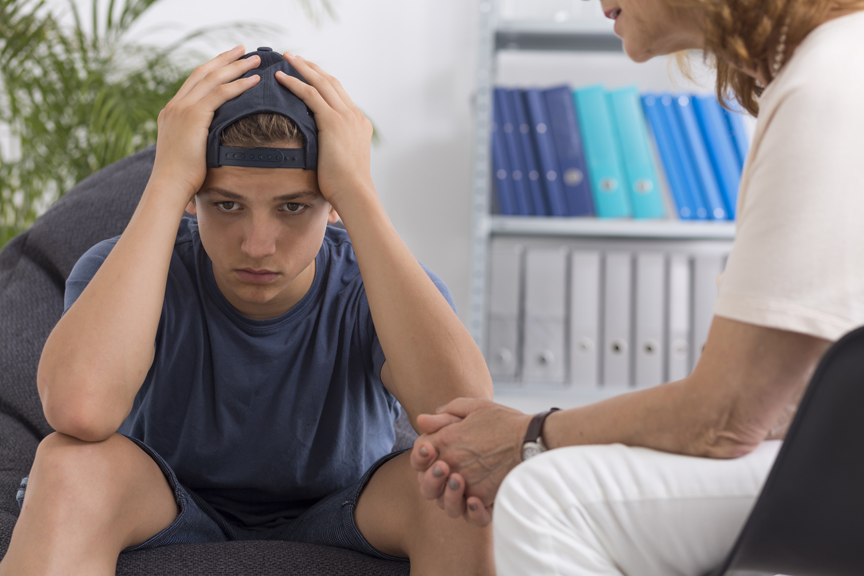- Behavior
- Health
- Parenting
Should I worry my moody teen is sulking too long? Find out here

In this article, you’ll find answers to questions like:
1. What are red flags for emotional issues?
2. What are specific signs?
3. Who can help?
Teenage angst typically lasts a few days. But prolonged behavioral changes — when your teen is sad for two weeks or longer — can indicate a mental health concern, says Renée Layman, chief executive officer for the Center for Child Counseling, which is funded in part by Children’s Services Council of Palm Beach County.
Parents and caregivers should trust their judgment on figuring out if the nature, intensity, severity and duration are out of character.
1. WHAT ARE RED FLAGS FOR EMOTIONAL ISSUES?
“Your child may be struggling with mental health issues if behavioral changes are intense or out of proportion to stress or changes in the
environment, which can include shutting down emotionally or displays of
physical aggression,” Layman says. A depressed child may show more irritability, where an adult typically shows sadness.
“Your teen may experience intense emotions, especially revolving around friendships and boyfriend/girlfriend drama,” Layman says. “Things that may not seem like a big deal to you may seem overwhelming and world-ending to your teen.”
Helping teens cope is the subject of videos available for free viewing on the Center for Child Counseling website and its YouTube channel.
2. WHAT ARE SPECIFIC SIGNS?
- Mood changes, such as sadness, withdrawal
- Wanting to hurt others, self-harm
- Intense feelings such as fears, anxiety
- Headaches or stomach aches
- Trouble focusing or sitting still
- Rapid weight loss or gain
3. WHO CAN HELP?
The community/crisis helpline at 211 is available 24 hours a day. Crisis intervention, information and referrals for all ages are addressed by trained specialists. You can also chat with them online. Specialists speak English, Spanish and Creole. Interpreters in other languages are available.
Parents can call Palm Beach County's Children's Behavioral Health Collaborative, to assess needs and get access to mental health services. The Center for Child Counseling is one of those organizations, at 561-244-9499.
SOURCES:
• Patrice Schroeder, Community Relations specialist, 211 Palm Beach/Treasure Coast
• Renée Layman, chief executive officer, Center for Child Counseling
You May Also Like
-
- Behavior
- Parenting
- Safety
Ages 14-18: Keep communicating during this life-changing stage
At this age, older teens' sense of responsibility increases, and intimate and romantic relationships develop. Read on for more insight about key developmental milestones from our e …
Read More -
- Behavior
- Education
- Health
Ages 11-14: Giving cold shoulder? Don’t worry, it’s sign of maturing
Moodiness may peak for teens between ages 12 to 14, and independence increases. This is a time of many physical, mental, emotional and social changes. Read on for more insight abou …
Read More -
- Behavior
- Health
- Parenting
Discover calming ways to help your family manage stress
To help reduce tension, start by identifying triggers. If you're worried about your teen's behavior, tap here for local organizations that can help. …
Read More -
- Behavior
- Health
- Parenting
BLOG: How can we help our kids struggling with our divorce?
Blog question: My husband and I are getting divorced. Our kids are really upset. One is giving me a lot of attitude, saying it’s all my fault. The other one just cries all the time …
Read More
Related resources
-
- Behavior
- Health
- Other
Mental Health America of the Palm Beaches
Based in West Palm Beach, local information and services related to mental health, including support groups, referrals and an online screening test.
561-832-3755 Website Email -
- Behavior
- Health
- Parenting
Children's Behavioral Health Collaborative - Palm Beach County
A collaboration of five local mental health agencies that assess and treat children's serious behavioral, emotional or mental health problems
561-244-9499 Website -
- Behavior
- Parenting
Community Partners
Positive Parenting Program, known as Triple P — free seminars and one-on-one guidance to help families improve their parent-child relationships
561-841-3500 Website Email
